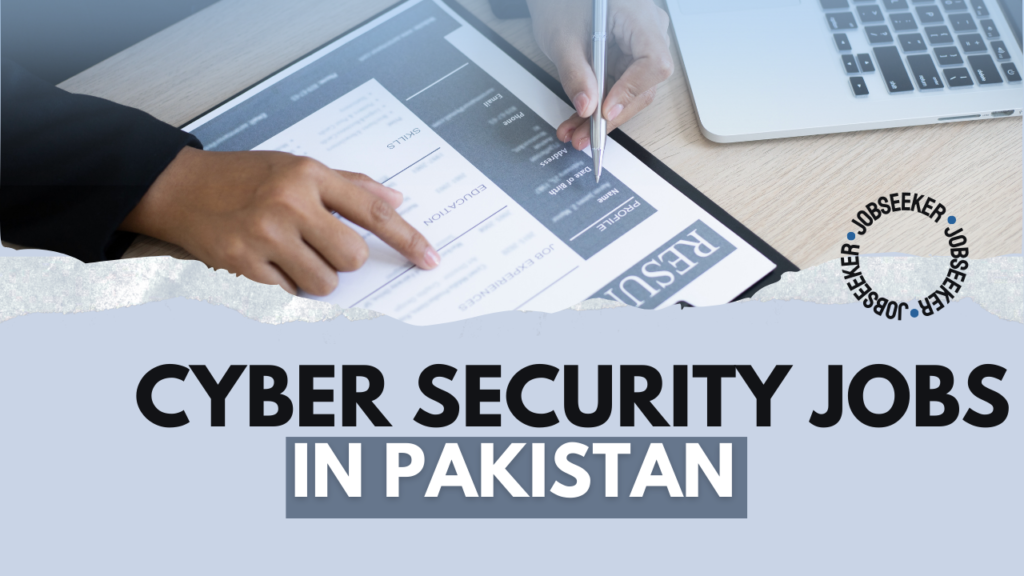
How to find Cybersecurity jobs in Pakistan
Table of Contents
Introduction:
The importance of cybersecurity jobs in Pakistan cannot be overstated. As businesses and individuals alike become more reliant on technology, the need for skilled professionals to protect digital assets and sensitive information has surged. Pakistan, too, has witnessed a significant uptick in the demand for cybersecurity experts. In this blog post, we’ll explore the burgeoning field of cybersecurity jobs in Pakistan, shedding light on opportunities, challenges, and the skills required to thrive in this dynamic industry.
Rising Demand for Cybersecurity Professionals:
With the increasing frequency and sophistication of cyber threats, organizations in Pakistan are recognizing the necessity of fortifying their digital defenses. This has led to a surge in demand for cybersecurity professionals across various sectors, including finance, healthcare, government, and more.
Key cybersecurity jobs in Pakistan: in Pakistan
a. Cybersecurity Analysts: Responsible for monitoring network security, analyzing vulnerabilities, and implementing measures to safeguard against cyber threats.
b. Ethical Hackers (Penetration Testers): Conduct authorized simulated cyberattacks to identify and rectify potential weaknesses in systems.
c. Security Consultants: Advise organizations on best practices, policies, and technologies to enhance overall cybersecurity posture.
d. Incident Responders: React promptly to cybersecurity incidents, mitigating damage and preventing future occurrences.
Industry Landscape:
a. Financial Sector: Banks and financial institutions in Pakistan are actively recruiting cybersecurity professionals to protect sensitive financial data and transactions.
b. Healthcare: With the digitization of health records, there’s a growing need for cybersecurity experts to secure patient information and medical systems.
c. Government: National security concerns have prompted increased investment in cybersecurity, leading to a rise in government job opportunities in this field.
Educational Pathways and Certifications
a. Bachelor’s and Master’s Degrees in Cybersecurity: Many universities in Pakistan now offer specialized programs in cybersecurity.
b. Certifications: Industry-recognized certifications like Certified Information Systems Security Professional (CISSP), Certified Ethical Hacker (CEH), and CompTIA Security+ enhance credibility in the job market.
Challenges and Opportunities to Find Cybersecurity Jobs in Pakistan
a. Skill Gap: While the demand for cybersecurity professionals is high, there is a noticeable skill gap. Continuous learning and upskilling are crucial to stay relevant.
b. Remote Work: The pandemic has accelerated the adoption of remote work, opening up opportunities for cybersecurity professionals to work for global companies from the comfort of their homes.
cybersecurity jobs in Pakistan
Future Trends in Cybersecurity
1. Artificial Intelligence (AI) and Machine Learning (ML):
- Description: The integration of AI and ML technologies in cybersecurity is expected to play a crucial role in improving threat detection and response capabilities.
- Impact: AI and ML can enhance the ability to analyze vast amounts of data quickly, identify patterns, and automate responses to potential threats. This trend is likely to result in more effective and adaptive cybersecurity solutions.
2. Internet of Things (IoT) Security:
- Description: With the proliferation of IoT devices, ensuring the security of these interconnected devices is becoming a significant focus in cybersecurity.
- Impact: As more devices become connected to the internet, the attack surface for cyber threats expands. Cybersecurity professionals will need to develop expertise in securing IoT devices, networks, and the data generated by these devices.
3. Zero Trust Security Model:
- Description: The traditional security model that trusts entities within a network is evolving towards a “Zero Trust” approach, where trust is never assumed, and verification is required from everyone trying to access resources.
- Impact: This approach is designed to enhance security by assuming that threats may exist both within and outside the network perimeter. Implementing a Zero Trust model requires robust authentication, authorization, and continuous monitoring.
4. Cloud Security:
- Description: As organizations increasingly migrate to cloud-based infrastructures, securing cloud environments is becoming a critical aspect of cybersecurity.
- Impact: Cybersecurity professionals will need to adapt to securing data and applications in the cloud, addressing challenges such as data privacy, secure configurations, and access management in cloud environments.
5. Quantum Computing and Cryptography:
- Description: The advent of quantum computing poses a potential threat to current cryptographic methods, prompting the need for quantum-resistant cryptographic algorithms.
- Impact: Cybersecurity professionals will need to stay abreast of developments in quantum-resistant cryptography to ensure the security of digital communications in a post-quantum computing era.
6. Automation and Orchestration:
- Description: Increasingly, cybersecurity tasks are being automated to improve efficiency and response times.
- Impact: Automation of routine tasks allows cybersecurity professionals to focus on more complex issues. Orchestration enables the coordination of multiple security processes, providing a more streamlined and effective response to cyber incidents.
Conclusion
As Pakistan strides into a digitally connected future, the importance of cybersecurity jobs in Pakistan cannot be overstated. The field offers exciting opportunities for those with a passion for technology and a commitment to safeguarding digital assets. By acquiring the right skills and staying abreast of industry trends, aspiring cybersecurity professionals can carve out a fulfilling and impactful career in this ever-evolving field. read more








